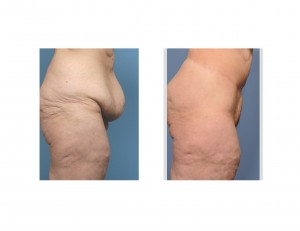Gastric bypass surgery, or even persistent efforts at diet and exercise, can result in large amounts of weight loss. With this weight loss often comes a lot of loose skin over many parts of the body. This has resulted in a number of body contouring procedures that removes this excess skin. Such efforts at bariatric plastic surgery is not usually done for a year after gastric bypass to ensure that the weight loss is sustained and the patient’s metabolic state is stabilized.
A recent study in the October 2013 issue of the journal Plastic and Reconstructive Surgery reported that body contouring surgery to remove excess skin also improves long-term weight control. Since maintaining weight loss to reduce long-term health problems is the key goal of bariatric surgery, the researchers believe that body contouring should be considered reconstructive rather than cosmetic surgery for patients who have achieved massive weight loss.
In this study, the authors compared long-term weights from two groups of patients who had gastric bypass surgery. One group of 102 patients had gastric bypass surgery without any body contouring surgery which was compared to a group of 98 patients who had both gastric bypass and body contouring surgeries with excess skin removal. Gastric bypass patients who went on to have body contouring procedures regained less weight long-term. They averaged just over one pound per year which was substantially less than the four pounds per year for those patients who had gastric bypass alone.
Patients who underwent body contouring surgery after gastric bypass surgery achieved an average weight of 176 pounds seven years later. This is in contrast to the gastric bypass surgery only group which had an average weight of 200lbs. Patients who underwent body contouring had regained about four percent of their initial body weight, compared to 11 percent for those who had gastric bypass only. After accounting for the weight of excess skin removed, average weight regain was about 14 pounds in patients who had gastric bypass plus body contouring, compared to nearly 50 pounds with gastric bypass only.

The authors point out that this study supports the notion that body contouring surgery should be considered part of the gastric bypass procedure and thus covered by insurance. The quality of life improvements seen (sustained weight loss) support that body contouring surgery is a reconstructive and not cosmetic surgery procedures.
I would not dispute the argument that bariatric plastic surgery is reconstructive surgery that treats an induced medical problem. However the reality is that many insurances are going to continue to view body contouring after gastric bypass as unnecessary cosmetic procedures and will not provide coverage for most of the with the exception of an abdominal panniculectomy. As we proceed into this new era of ObamaCare under the Affordable Care Act, it is likely that even coverage for abdominal panniculectomies will go away or the reimbursements will be so low plastic surgeons will simply not do them.
Dr. Barry Eppley
Indianapolis, Indiana


